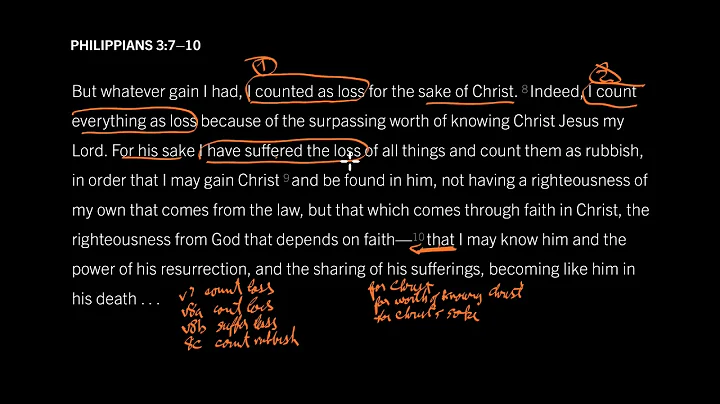The Remarkable Journey of Frederick Douglass
Table of Contents
- Introduction
- Early Life and Family Separation
- Education and Literacy
- The Turning Point: Douglass' Fight Against Slavery
- The Role of Community and Relationships
- Escape to Freedom with Anna Murray
- Activism and Anti-Slavery Oratory
- The Narrative of the Life of Frederick Douglass
- The North Star and the Fugitive Slave Law
- Douglass' Optimism and Faith in the Fight for Freedom
- Influence on Abraham Lincoln and the Emancipation Proclamation
- Post-War Years and Continued Advocacy
- The Legacy of Frederick Douglass
- Conclusion
📚 Article
Introduction
Frederick Douglass, a true legend and one of the greatest figures in American history, lived a life filled with extraordinary accomplishments. As the most photographed man of the 19th century, Douglass was not only an influential abolitionist and orator but also a highly esteemed writer. This article delves into the life and times of Frederick Douglass, chronicling his journey from enslavement to liberation, and his relentless commitment to fighting against the injustice of slavery.
Early Life and Family Separation
Born in Maryland in either 1817 or 1818, Frederick Douglass experienced the horrors of slavery from a young age. His mother, an enslaved woman, lived on a different plantation, and Douglass saw very little of her. The separation of enslaved families was a common and heartbreaking aspect of slavery. As Douglass grew up, the loss of his mother and the absence of a stable family unit would shape his understanding of the cruel and dehumanizing nature of slavery.
Education and Literacy
Despite the oppressive conditions of slavery, Douglass's journey towards freedom began when he was taught the alphabet and basic words by Sophia Auld, the wife of his enslaver. This newfound literacy opened up a world of possibilities for young Frederick, enabling him to see the world through a different lens. However, his burgeoning education was cut short when Sophia's husband, Hugh, put a stop to the lessons, recognizing the threat of an educated slave. Undeterred, Douglass continued to learn in secret, later taking on the role of a teacher himself, empowering other enslaved individuals by imparting the gift of literacy.
The Turning Point: Douglass' Fight Against Slavery
One pivotal event in Douglass's life occurred when he was rented out to Edward Covey, known for "breaking" unruly enslaved people. For months, Douglass endured relentless abuse at the hands of Covey. However, one day, Douglass decided to fight back, refusing to accept his fate as a mere slave. In a fierce battle, Douglass triumphed over Covey, reclaiming his sense of manhood and igniting a spark of freedom within him. This courageous act would forever change the course of Douglass's life and solidify his dedication to the abolitionist cause.
The Role of Community and Relationships
Beyond physical resistance, Douglass found strength and affirmation of his humanity in the community he built and the relationships he cultivated. In 1838, Douglass married Anna Murray, a free Black woman who played a significant role in his escape from slavery. Anna's support and financial contributions ensured the survival of their family, allowing Douglass to focus on his activism. This partnership exemplifies the resilience and determination exhibited by Black women throughout history, often overlooked in historical records.
Escape to Freedom with Anna Murray
With the aid of borrowed papers and a sailor's uniform as a disguise, Douglass embarked on a daring journey from Baltimore to New York, culminating in his quest for freedom. This escape was a turning point in Douglass's life, as he declared, "A new world had opened upon me." His arrival in New York filled him with a sense of liberation and the desire to actively contribute to the fight against slavery.
Activism and Anti-Slavery Oratory
In Massachusetts, Douglass emerged as a prominent anti-slavery orator and abolitionist, captivating audiences with his powerful speeches. His ability to articulate the harsh realities of slavery profoundly impacted those who heard him, further fueling the movement to end this institution of oppression. Douglass's persuasive oratory skills garnered attention from renowned white abolitionists, such as William Lloyd Garrison, eventually leading to his involvement with The Liberator, an influential abolitionist publication.
The Narrative of the Life of Frederick Douglass
One of Frederick Douglass's most notable achievements was his autobiography, "Narrative of the Life of Frederick Douglass, an American Slave," published in 1845. This seminal work provided a firsthand account of the brutalities of slavery and challenged the notions held by many that an enslaved person lacked the intellectual prowess to write such a compelling narrative. Douglass's book became a catalyst for change, encouraging widespread opposition to the institution of slavery.
The North Star and the Fugitive Slave Law
Not one to rest on his laurels, Douglass established the newspaper, The North Star, alongside Martin Delany. The publication served as a platform to discuss critical issues such as the controversial Fugitive Slave Law of 1850. This law further endangered the lives of escaped slaves and free Black individuals, increasing the urgency of the abolitionist movement. Douglass's writings and activism played a pivotal role in resisting these oppressive measures and shedding light on the atrocities of slavery.
Douglass' Optimism and Faith in the Fight for Freedom
Despite the challenges faced by Black people during this tumultuous era, Douglass maintained an unwavering optimism in the face of adversity. Rooted in his Christian faith, he believed that God would ultimately bring justice to a nation built on the principles of equality and freedom. Douglass's activism extended to his efforts to persuade President Abraham Lincoln to prioritize Black freedom during the Civil War. He believed that Black men fighting in the war would demonstrate their patriotism and worthiness of full citizenship.
Influence on Abraham Lincoln and the Emancipation Proclamation
Frederick Douglass's relentless advocacy influenced President Abraham Lincoln's decision to issue the Emancipation Proclamation on January 1, 1863. This proclamation marked a significant turning point in the Civil War, shifting both the domestic and international dynamics of the conflict. Douglass' tireless efforts to prioritize Black freedom and his belief in the power of human agency played a vital role in shaping the course of American history.
Post-War Years and Continued Advocacy
After the Civil War, Douglass continued his activism through public speaking, essay writing, and revising his earlier books. He occupied several political positions and worked diligently to secure the rights and welfare of Black people. Douglass's commitment to justice and equality remained unyielding, as he navigated the complexities of the post-war era.
The Legacy of Frederick Douglass
Frederick Douglass's legacy is one of unwavering dedication and immense impact. Through his speeches, writings, and actions, he confronted the hypocrisy of a nation built on the principles of freedom while denying basic human rights to enslaved individuals. Douglass's life serves as a testament to the power of resilience, education, and community in the fight for justice. His work continues to resonate today as a reminder of the ongoing struggle for equality and the importance of valuing the humanity of all people.
Conclusion
Frederick Douglass, a legendary abolitionist, writer, and orator, played a crucial role in shaping American history. From his traumatic experience as an enslaved person to his courageous fight for freedom, Douglass exemplified resilience, intellect, and unwavering dedication. His words and actions continue to inspire generations, challenging us to confront and dismantle the systemic injustices that persist in our society. Frederick Douglass's story will forever be intertwined with the pursuit of justice and the enduring legacy of the Black struggle for equality.
Pros
- Provides a comprehensive overview of Frederick Douglass's life and contributions.
- Engaging and informative narrative style brings history to life.
- Highlights Douglass's resilience, activism, and dedication to justice.
- Illuminates the importance of community and relationships in the fight against oppression.
Cons
- Due to limited space, some aspects of Douglass's life may not be fully explored.
- More emphasis could be placed on the significance of Douglass's writings.
- Further analysis of the impact of Douglass's work on contemporary society would enhance the article's relevance.
Highlights
- Frederick Douglass, a legendary abolitionist and writer, fought against the injustice of slavery.
- Despite family separation and limited education, Douglass gained literacy and used it to empower others.
- Douglass's rebellion against brutal enslavement marked a turning point in his fight for freedom.
- Community and relationships played a vital role in Douglass's journey to liberation.
- Douglass's partnership with Anna Murray, his wife, was instrumental in his escape from slavery.
- From Massachusetts, Douglass became a prominent anti-slavery orator and writer.
- His autobiography, "Narrative of the Life of Frederick Douglass," challenged societal beliefs about the abilities of enslaved individuals.
- Douglass's newspaper, The North Star, addressed critical issues such as the Fugitive Slave Law.
- His unwavering faith and activism influenced President Abraham Lincoln and the Emancipation Proclamation.
- Douglass's legacy continues to inspire and remind us of the ongoing struggle for justice.
FAQ
Q: What impact did Frederick Douglass have on the abolitionist movement?
A: Frederick Douglass played a pivotal role in the abolitionist movement through his powerful speeches, writings, and activism. His ability to articulate the harsh realities of slavery and the moral imperative to end it, influenced countless individuals and energized the fight against injustice.
Q: How did Frederick Douglass's escape to freedom impact his advocacy for abolition?
A: Frederick Douglass's escape to freedom solidified his commitment to the abolitionist cause. It transformed him into a powerful advocate for the rights of enslaved individuals, and he used his own story as a tool to expose the horrors of slavery and inspire others to join the fight for liberation.
Q: How did Frederick Douglass's faith inform his activism?
A: Frederick Douglass, a devout Christian, believed in the righteousness of his cause and trusted that God would ultimately bring justice to the nation. However, he also recognized the importance of taking action and actively fought against slavery, relying on his faith to guide and strengthen him in the face of adversity.
Q: What was the significance of Frederick Douglass's partnership with Anna Murray?
A: Anna Murray, a free Black woman, played a crucial role in Frederick Douglass's journey to freedom. Not only did she provide essential support during his escape, but she also took on the responsibility of financially supporting their family. Anna's contributions allowed Douglass to focus on his activism and solidify his place in history.
Q: How does Frederick Douglass's legacy resonate with modern-day struggles for equality?
A: Frederick Douglass's legacy continues to inspire and remind us of the ongoing struggle for justice. His fight against the dehumanizing institution of slavery serves as a reminder of the importance of resisting oppression and uplifting the humanity of all people. Douglass's words and actions remain relevant in contemporary discussions about systemic racism and the pursuit of equality.
Resources:







